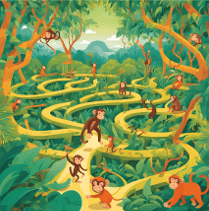
In the Academic Zoo, the monkeys faced a grand challenge: a complex maze filled with puzzles and traps. At the centre of the maze were golden bananas, symbols of success and recognition.
Some monkeys navigated the maze with ease, carrying maps drawn from years of trial and error, with markings quietly passed from one to another. Others, however, stumbled through the maze without any guidance, left to navigate its complexities alone. “You just need to try harder”, the zookeepers said dismissively to those who struggled.
Amid the confusion, a group of monkeys started changing how they approached the maze. They began sharing what they learned—paths to avoid, traps to watch for, and strategies to succeed. Instead of hoarding their knowledge, they collaborated, mapping the maze not just for themselves but also for those who would come next.
This collective effort became a network of care. The monkeys helped each other, celebrated their successes, and learned from their missteps. Over time, the maze was no longer a place of solitary struggle but a shared challenge, where knowledge and support flowed freely among all.
The zookeepers watched in astonishment. “Perhaps it was never about who could succeed on their own”, one reflected. “Perhaps it was about how they could uplift each other.”
Moral: Mentoring transforms academia by breaking down barriers of isolation and competition. It fosters a culture where shared knowledge and care pave the way for collective success, leaving a legacy of collaboration for generations to come.
Were there times when others supported you?
What are your strategies for supporting and mentoring others?
Christa & Anne-Wil

